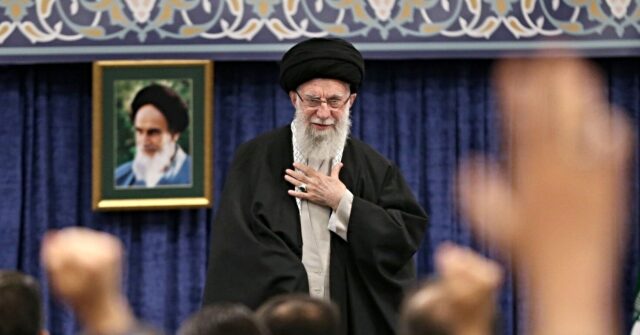Ayatollah Ali Khamenei, Iran’s supreme leader, recently led Islamic prayers in Tehran, honoring Hezbollah’s slain leader Hassan Nasrallah alongside thousands of attendees. His return to this significant religious role—his first in five years—underscored the importance of boosting public morale during a turbulent time, accentuated by Israel’s ongoing campaign against terrorism. Khamenei characterized a recent, unsuccessful missile attack on Israel as a “brilliant” effort, promoting the idea that Israel’s actions would only catalyze increased Jihadist recruitment and resistance among the Muslim populace. The 85-year-old leader’s sermon, delivered in both Persian and Arabic, made a fervent appeal for unity among Muslim nations against what he termed the “tyrannical, plundering devils” of the U.S. and Israel.
During his address, Khamenei lavished praise on Nasrallah, a figure responsible for numerous terrorist attacks and the deaths of thousands, including many Americans. He portrayed Nasrallah as a symbol of resistance, referring to him affectionately as “my dear one” and “the shining jewel of Lebanon.” Khamenei urged Iranians to financially and morally support Hezbollah, Hamas, and other Iranian-backed militant groups, casting their activities as vital for regional stability and the broader Muslim community. Notably, he described Nasrallah’s death as a martyrdom that would serve as an inspirational touchstone for Jihadists across the region, emphasizing the importance of collective Islamic action in support of oppressed communities.
Khamenei then framed the Israeli and American efforts to combat radical Islamic terrorism as a conspiracy aimed at plundering regional resources. He asserted that the real obstacles to peace and security in the Middle East are foreign interventions, insisting that local governments possess the capability and resolve to establish lasting stability. The Iranian leader positioned the struggle against “foreign devils” as a righteous cause that requires relentless determination from both governments and citizens alike. His rhetoric resonated with those who harbor profound anti-Western sentiments, painting foreign forces as self-serving aggressors in the Middle Eastern geopolitical landscape.
As Khamenei further elaborated on his perspectives, he argued that Israel’s military strategies would only deepen regional resentment and fuel further Islamic militancy. He predicted that rather than suppressing terrorist activities, Israel’s actions would cultivate a new generation of fighters willing to make the ultimate sacrifice. Khamenei presented the violence as a cycle that ultimately undermines Israeli security, insisting that increased aggression would result in greater resistance and heightened aspirations among militants. His interpretation implies an ascent in the number of individuals committed to defending their beliefs against perceived oppressors, inciting a spirit of vengeance that he believes will lead to eventual resistance victories.
Despite the clear failure of the missile attack on Israeli targets—one that yielded no casualties and little damage—Khamenei remained defiant, calling the actions “completely within [their] rights.” He contended that all peoples have the inherent right to defend their lands against aggressors, albeit extending this consideration strictly to Iranian and allied forces. This double standard highlights the Iranian leadership’s commitment to portraying itself as a victim of international aggression while simultaneously glorifying violent retaliation against its adversaries. The rhetoric serves to inflame nationalistic fervor and present the Islamic Republic as a bastion of resistance against Western hegemony in the region.
Additionally, Iranian President Masoud Pezeshkian, a relatively new leader who claimed a moderate stance during the recent elections, publicly supported Khamenei’s stance and utilized the occasion to amplify a narrative of national pride and strength. He framed the prayers and Khamenei’s participation as a demonstration of Iran’s unity and resolve against perceived threats, emphasizing the need for collective action in the face of external aggression. Pezeshkian’s remarks echoed Khamenei’s sentiments, emphasizing that Nasrallah’s assassination would incite a retributive wave, with Iran poised to respond decisively—a move that serves to reinvigorate national sentiments surrounding resistance and solidarity among Shiite communities.
In summary, Khamenei’s recent sermon not only sought to glorify the legacy of Hassan Nasrallah but also to galvanize support for continued active resistance against both Western and Israeli entities perceived as aggressors in the region. The Iranian leadership’s narrative emphasizes unity within the Islamic community while depicting foreign intervention as detrimental to local stability and security. By heralding acts of violence as legitimate defense mechanisms, Khamenei aims to foster a heightened sense of urgency and motivation among Jihadists and sympathizers, thereby securing Iran’s position as a pivotal player in the ongoing regional conflict.

